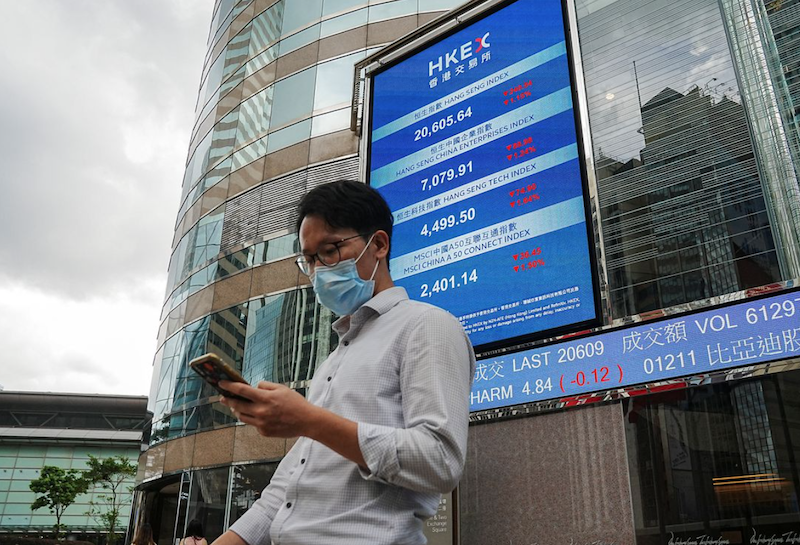Asian stocks were in retreat on Friday with investors spooked by China’s iPhone ban and the increasing threat of continued central bank tightening.
Beijing’s move to curb the use of Apple’s smartphone by government employees has shortened the odds on an escalating trade war between the world’s top two economies.
That, and increased worries about tighter US Federal Reserve policy after an overnight decline in US jobless claims, put pressure on indexes across the region.
Also on AF: China Wants to Ban Clothes, Comments ‘Harming National Spirit’
Japan’s Nikkei share average fell more than 1%, sending it to a first weekly loss in three, as the benchmark tracked Wall Street losses amid worries over more US rate hikes and the Chinese iPhone ban.
Tech and industrial companies were among the biggest losers, with chip-making equipment giant Tokyo Electron dropping 3.83% to become the Nikkei’s biggest drag.
The Nikkei slid 1.16% to 32,606.84, as of the close. That extended a 0.75% decline from Thursday when it also snapped an eight-day winning streak after touching a more than one-month peak of 33,322.45 early in the session. For the week, the benchmark index slipped 0.32%.
The broader Topix sagged 1.02% on Friday, also falling for a second day after marking a 33-year peak early in Thursday’s session.
China stocks fell, as investor optimism toward the world’s second-largest economy waned, while a weakening yuan pressured the stock market further.
Meanwhile, the Hong Kong stock exchange was closed due to a black rainstorm warning.
Trade numbers on Thursday showed a possible stabilisation in China’s downturn, but economists said China’s economy is still at risk of missing Beijing’s annual growth target of about 5%. Some of the recent easing measures may have little impact on the slowing economy, they added.
The Shanghai Composite Index lost 0.18%, or 5.63 points, to 3,116.72, while the Shenzhen Composite Index on China’s second exchange edged back 0.07%, or 1.32 points, to 1,935.54.
Huawei Smartphone Launch Boosts Chip Shares
China’s yuan weakened to the lowest level since December 2007, as the widening services trade deficit and yield gap with other economies, particularly the United States, affected capital flows and trade.
Most sectors fell, with shares in property developers, energy companies and media firms down between 1% and 2.5%.
Semiconductor shares rose 0.8% on the launch of Huawei’s Mate 60 Pro+ smartphone, which captured global attention for revealing the Chinese tech firm’s success in beating back US sanctions.
Elsewhere across the region, in early trade, markets were in the red. Indian stocks advanced with Mumbai’s signature Nifty 50 index up 0.47%, or 92.90 points, at 19,819.95.
MSCI’s broadest index of Asia-Pacific shares outside Japan fell 0.2% and was down 1.4% for the week.
European stocks looked set for a higher open, with futures for Eurostoxx 50 up 0.21%, and those for the German DAX up 0.18% and FTSE down 0.07%.
All eyes will be on European Apple suppliers after about $200 billion was wiped from the company’s market capitalisation in two days on reports of China curbing iPhone use by state employees.
US Dollar on Eight-Week Streak
The selling also came while tech stocks have been under extra pressure from US yields that have been rising on bets that US interest rates are likely to linger at 20-year highs.
That in turn has unleashed the dollar, which is up for an eighth straight week against a basket of currencies, a rally that has carried the US currency index more than 5% higher.
Dollar gains have pushed the Chinese yuan to a 16-year low and have prompted a step up in rhetoric from Japanese policymakers growing uncomfortable with the yen’s slide.
The yen has found new 10-month lows and, at 147.19 per dollar is heading towards the vicinity of 150, where traders see high risks of authorities stepping in with support.
The Australian dollar is down more than 1% on the week and traded at $0.6384 on Friday. Benchmark 10-year US Treasury yields are up over 5 basis points to 4.22% this week. Two-year yields are up 6 bps to 4.93%.
Brent crude prices are up this week, but gains on recently robust U. data have been tempered by softening indicators of demand in Europe and China. Brent futures were last steady at $89.33 a barrel, down 0.66% on the day, but up nearly 1% for the week.
Key figures
Tokyo – Nikkei 225 < DOWN 1.16% at 32,606.84 (close)
Hong Kong – Hang Seng Index <> CLOSED
Shanghai – Composite < DOWN 0.18% at 3,116.72 (close)
London – FTSE 100 < DOWN 0.40% at 7,411.93 (0934 BST)
New York – Dow > UP 0.17% at 34,500.73 (Thursday close)
- Reuters with additional editing by Sean O’Meara
Read more:
Hong Kong Shuts Down After Heaviest Rain on Record
China Tells State Officials to Stop Using iPhones at Work: WSJ
Nikkei Snaps 8-Day Streak; Property, Tech Drags on Hang Seng
























